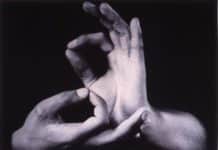
To begin with, the main point of meditation is that we need to get to know ourselves: our minds, our behavior, our being. You see, we think we know ourselves, but actually we don’t. There are all sorts of undiscovered areas of our thoughts and actions. What we find in ourselves might be quite astounding.
Meditation often means “to meditate on” something, but in this case I am referring to a state of meditation without any contents. In order to experience this state of being, it is necessary to practice what is known as mindfulness. You simply pay attention to your breath, as you breathe in and out, and to every detail in your mind, whether it is a thought-pattern of aggression, passion, or ignorance, or just insignificant mental chatter. Mindfulness also means paying attention to the details of every action, for example, to the way you extend your hand to reach for a glass. You see yourself lifting it, touching it to your lips, and then drinking the water. [Rinpoche takes a sip from his glass.] So every detail is looked at precisely—which doesn’t make you self-conscious, particularly, but it may give you quite a shock; it may be quite real. When mindfulness begins to grow and expand, you become more aware of the environment around you, of something more than just body and mind alone. And then, at some point, mindfulness and awareness are joined together, which becomes one open eye, one big precision. At that point, a person becomes much less crude. Because you have been paying attention to your thoughts and actions, you become more refined.
Out of that precision and refinement comes gentleness. You are not just paying attention, but you are also aware of your own pain and pleasure, and you develop sympathy and friendship for yourself. From that you are able to understand, or at least see, the pain and suffering of others, and you begin to develop a tremendous sense of sympathy for others. At the same time, such sympathy also helps the mindfulness-awareness process develop further. Basically, you become a gentle person. You begin to realize that you are good: totally good and totally wholesome. You have a sense of trust in yourself and in the world. There is something to grip onto, and the quality of path or journey emerges out of that. You feel you want to do something for others and something for yourself. There is a sense of universal kindness, goodness, and genuineness.
When you experience precision and gentleness, the phenomenal world is no longer seen as an obstacle—or as being particularly helpful, for that matter. It is seen and appreciated as it is. At this point, you are able to transmute the various defilements of passion, aggression, and ignorance into a state of wisdom. For example, when aggression occurs, you simply look at the aggression, rather than being carried away by it or acting it out. When you look at the aggression itself, it becomes a mirror reflecting back to your face. You realize that the aggression has no object; there is nothing to be aggressive toward. At that point, the aggression itself subsides, but its strength or energy is kept as a positive thing. It becomes wisdom. Here “wisdom” does not mean the usual notion of being wise. Wisdom is egolessness, or a state of being, simply being. The whole process requires a certain amount of mindfulness and awareness throughout, obviously. But you naturally develop a habit of seeing whatever defilement occurs just as it is, even if it is just for a glimpse. Then you begin to be freed from anxiety, and you begin to achieve a state of mind that need not be cultivated, and which cannot be lost. You experience a natural state of delight. It is not that you are always beaming and happy, or that you just stay in a state of mystical ecstasy. You feel other people’s suffering. It has been said in the texts that the Buddha’s sensitivity to others’ pain and suffering, compared to the sensitivity of an ordinary person, is like the difference between having a hair on your eyeball and having a hair on the palm of your hand. So “delight” in this case means total joy, having a total sense of “is-ness.” Then you are able to help others, you are able to help yourself, and you are able to influence the universe with an all-pervasive sense of is-ness which neither comes nor goes.
We follow these stages of meditation methodically, with tremendous diligence and the help of a teacher. When one reaches a state of no-question . . . [startled laughter erupts among the audience, as a loud thunder clap occurs nearby] . . . the natural dharma is proclaimed. [Rinpoche indicates environment with his fan.] Therefore one begins to feel, without egotism, that one is the king of the universe. Because you have achieved an understanding impersonality, you can become a person. It takes a journey. First you have to become nothing, and then you can become somebody. One begins to develop tremendous conviction and doubtlessness, without pretense. This stage is called “enlightenment,” or “wakefulness” in the ultimate sense. From the beginning, wakefulness has been cultivated through mindfulness, awareness, and sympathy toward oneself and others. Finally one reaches the state where there is no question whatsoever. One becomes part of the universe. [More loud thunder, accompanied by tumultuous rain.]
I think that is probably enough at this point. There are various details and technicalities regarding the types and stages of meditation, but since time is short, and also since it would be futile to talk about this and that too much, I would like to stop here. Thank you.






